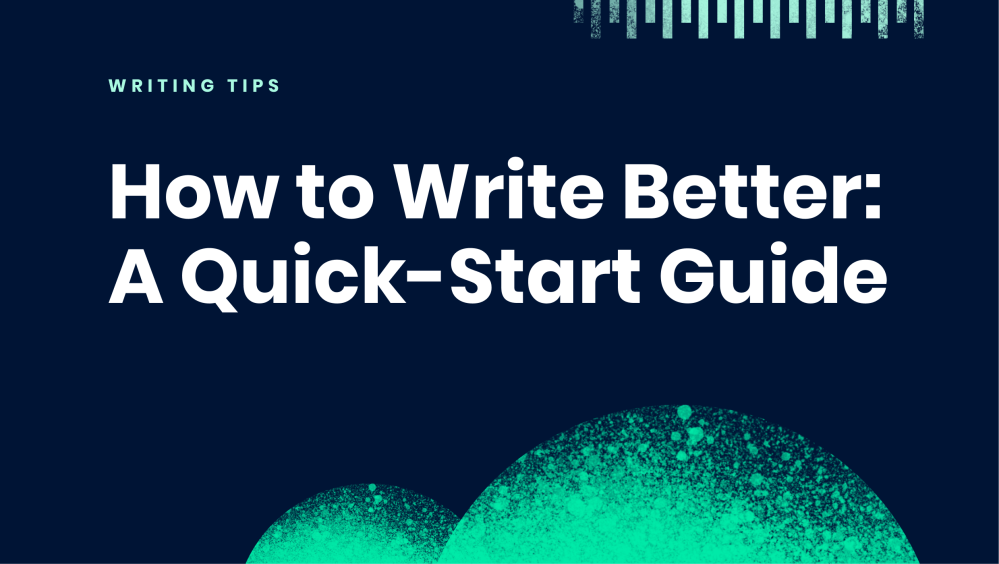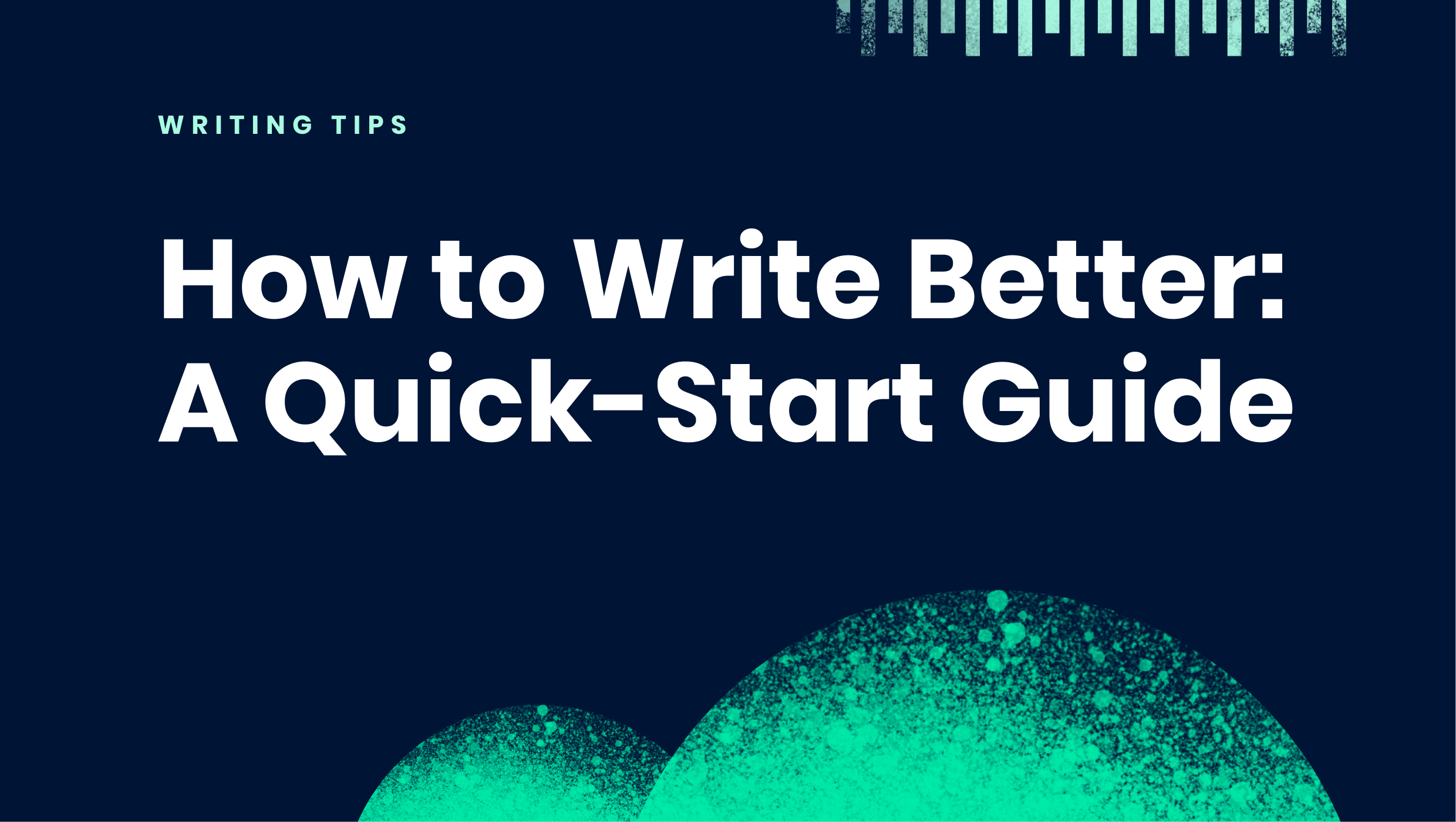Words at work
– 14 min read
How to write better: a quick-start guide for anyone and everyone

Just about everyone knows how to write — but writing well is something different. Great writers are formed through hard work and a passion for learning. But just like you, they all started from the beginning.
Problem is, a lot of “start writing well’ articles focus on the result. But good writing begins before you tippity-tap on that keyboard. Studying everyday practices, learning how to organize your thoughts, and then turning those ideas into effective writing should be your priority.
Whether you’re a blogger, an SEO writer, a marketer, or want to be the next Stephen King, these universal writing tips give you lots of ways to write better.
15 writing tips to help you write better
1. Think before you start writing
One of the best writing tips for beginners is organizing your thoughts in a logical, explainable manner before putting pen on paper. The biggest hurdle is often not knowing how to begin or what to say—everything is a jumble of ideas that probably look like a bunch of paint thrown against a wall (and not in an artistic way). It can be very frustrating.
Note: THIS IS NORMAL. Don’t get discouraged. There’s a reason the phrase “writer’s block” exists. Let yourself think about it for a day or two, especially if you’re doing creative writing. You’ll be surprised at how that paint blob slowly transforms into a recognizable shape.
2. Embrace the writing “brain dump”
In business writing, the “brain dump” signals the beginning of every new project or assignment. It’s the opportunity to get whatever is in your head out on digital paper in a stream of consciousness.
Avoid correcting misspellings, typos, sentence structure, or grammar—just type, type, type until your brain excavates all musings. You can use this creative writing skill for all kinds of work, from personal blogging and copywriting to essays and work emails.
Remember that at this phase of writing: bad ideas don’t exist. Your best creative ideas will come when you’re not held back by perfectionism.
3. Make an outline
Now that you have all your wonderful, messy thoughts on paper, it’s time to get more granular and organized. Some tips on how to edit your brain dump: do a first pass and delete the parts that are definite “nos.” Then go through again and highlight the ideas you like best. Revisit the “maybes” later.
Now, take your favorites and as briefly or as detailed as you like, make an outline that conveys your message. Start top-level with your biggest, overarching ideas, and then get into the details. Fill in missing parts, elaborate on other parts—rinse and repeat until satisfied.
4. Know your audience
This is a straightforward writing tip for beginners, but a lot of people forget it. For example, your voice and elements of style for personal blogging will be much more informal than business writing (i.e writing a proposal for a new client). Being mindful of your audience is key to improving writing skills and creating more impactful work.
5. Keep a journal
Being a better writer means writing more! Keeping a journal should be a very low-pressure thing. It can be as simple as writing a list of things you did that day, playing around with word choice for a LinkedIn headline, or recounting a conversation you had with a friend.
If you don’t want to keep a physical journal, you can start a note on your phone or a document on your computer. The point is—there are no journaling rules. Just start writing whenever you feel like it, because the more you do it, the more naturally it will come to you.
6. Pen a letter instead of texting
Great writers write letters for fun and for practice. Pen a letter (or an email) to a friend who lives in another city. A hundred years ago, people wrote long letters detailing everything from the mundane to faraway travel. Why not now? It’s the perfect way to get your creative writing juices flowing, rather than relying on boring texts.
Remember to check spelling, comma use, sentence structure, typos, etc. Your friends deserve good writing too. Spell-check is a nice starting point, but writing well happens when you use a reputable grammar or punctuation checker tool like Writer to support you.
7. Read more to do better writing
One of the best, passive ways of becoming a better writer is to read a book (Stephen King’s work makes for great binge reading). Not into books? Long-form business writing, graphic novels, or short stories do the trick as well.
Reading every day puts you in the fast lane for improving your writing skills. As Roz Morris, the author of the bestseller book, Nail Your Novel, puts it: “Reading exposes us to writing that’s better than our own and helps us to improve. Reading—the good and the bad—inspires you.”
By reading more, your brain will naturally pick up on things like good word choice, different writing styles, and good sentence structures. It also improves your reading comprehension and concentration levels (which comes in handy for the procrastinators among us, including me).
8. Keep your writing simple
As the legendary American novelist, Jack Kerouac, once said, “One day I will find the right words, and they will be simple.”
One big misconception about writing is that it should be full of beautiful prose and impressive words. Wrong! Sure, I can use the word 'floccinaucinihilipilification,' but most people will just think my cat walked across my keyboard.Click To TweetNo matter who they are, you should empower readers with your words. Complex writing can leave readers feeling insecure, weary, or both. To simplify your writing:
- Replace adverbs with more powerful verbs (e.g. she talked quietly > she whispered)
- Get rid of unnecessary adjectives
- Opt for simple word choice
- Delete fluff (e.g. instead of saying “in order to”, say “to”)
Go ahead and make use of a thesaurus, but don’t try to be a Shakespeare or even an Ernest Hemingway—just keep it simple and true to yourself.
9. Tone up your tone in writing
Getting tone right is key to being a good writer. It’s the personality of your writing, influenced by the type of writing you’re doing and who you’re talking to.
Just like we said in “Know Your Audience,” business writing like an email might sound conservative, while a personal social media post can be friendly and casual. Your tone can and should change depending on your needs. An extreme example: don’t start a cover letter with: “Hey, dude! Wassup?”
10. Prioritize your key points
If you want to learn how to write good, sentence structure and word placement is everything. If you have a question to ask, don’t put it in the middle of a paragraph, because it could get skipped over. Similarly, if you have an important piece of information to share, make it into its own paragraph or strategically place it in the introduction or conclusion—the sections readers tend to pay attention to the most.
11. Break up your writing into bite-size bits
Long sentences that are full of fluff are boring to read! Like staring directly at the sun—you just have to look away. Instead of creating a heavy block of text, break down large sections of information into concise, punchy sentences. Bullet points in particular are an amazing tool. They help you:
- Communicate information effectively and quickly
- Emphasize important points that are more easily remembered
- Provide easily digestible information to the reader
(See? They come in handy) AI writing software like Writer can help you be a better writer by identifying paragraphs that are hard to read.
12. Use active voice
Once you’re comfortable with sentence structure, punctuation and comma use, and word choice, it’s time to look at elements of style. One core element is passive voice vs. active voice.
An active voice is key for effective writing. It makes for a much more engaging read, conveying a strong and clear tone. Whereas passive voice pulls you away from the action, which can create an apathetic experience.
Here’s an example:
- Active voice: The thief stole one million dollars (subject + verb + object).
- Passive voice: One million dollars was stolen by the thief (object + past participle + subject).
See how in the first sentence, the subject performs the action? This eliminates extra processing time by getting to the point faster, unlike the passive voice example which puts the subject at the end of the sentence.
13. Edit (then edit again)
Now that you’ve overcome writer’s block and have the first draft, it’s time to move on to the editing process. Chances are, you’re not a professional editor, but that doesn’t matter—you can do a great job on your own. First, don’t edit immediately after writing. You want fresh eyes on that baby. Revisit it the next day and it will be easier to look for:
- unnecessary words (like adverbs and adjectives)
- long sentences that can be shortened
- passive voice use
At this phase, don’t worry about grammatical errors. Right now, you’re editing for clarity of your ideas and thoughts.
14. Proof your writing
Proofreading is where you check spelling, punctuation (i.e. comma use), run-on sentences, typos … you get the picture. Spell-check is a good starting point, a reputable grammar checker tool like Writer gives you advanced support.
Whenever possible, ask a real human to read your writing. They’ll likely be able to point out any writing mistakes and even offer suggestions. Over time, the lessons you learn from using these tools will help you become a great writer.
15. Reflect on your main point
We’ve made it to the very end. You’ve taken your idea and found many words to make into numerous sentences that communicate your intended message… or did you?
The last step is to always take an objective look at your writing. Pretend you’re a total stranger. Now ask yourself—does the narration make logical sense? Can you read it once and understand its message? Even better, can you sum it up in a few sentences? If so, you’ve written something you can feel good about.
8 exercises to improve writing skills
Here are fun activities you can do every day to become a better writer.
1. Write every day
This is the best writing tip for beginners. Write like it’s your job. Practicing every day is key to learning how to write good. It helps you stretch those writing muscles and learn from doing. Keeping a journal with you at all times also means you can write whenever inspiration strikes, like when you’re walking your fave four-legged friend.
Write every day, and you’ll turn it into a habit. That doesn’t mean you have to write ten thousand words every day, as the author of the children’s novel, See You in the Cosmos, Jack Cheng says:
“When mastery is the goal, spending an exorbitant number of hours in one sitting will likely lead to burnout. We don’t go to the gym expecting to put on 20 pounds of muscle in a single, day-long workout. Instead, we do several short workouts a week, spread out over months.”
2. Turn long paragraphs into bullet points
Want to learn how to write better sentences? Sentences that are easy to read and get to the point right away? Practice the art of brevity by chopping up hard-to-read paragraphs into succinct bullets.
This is especially useful for business writing because your readers are likely short on time. They want you to get to the point fast! And they want easy to digest information.
There is a place for long sentences in your work though, especially when it comes to creative writing. Writology has a great guide on this full of ace writing tips for beginners.
3. Change passive voice into active voice
A little recap on passive and active voice: Active voice is when the sentence starts with the subject acting on the verb. Passive voice is when the subject is a recipient of the verb’s action. Active voice is more engaging because it takes less processing time from the reader, and also gives the impression that the action is happening now, not in the past.
Use an AI writing platform like Writer to spot unengaging instances of passive voice and transform them into the active voice. This will help you draw readers in and make your writing easier to read.
4. Use grammar checker tools like Writer
Use a grammar checker like Writer helps you spot mistakes you may have missed. Mistakes such as misused commas, spelling errors, typos, incorrect use of words (we’re looking at you, thesaurus lovers), etc. Writer is also ideal for business writing. You can submit your company style guide and the app will measure your written work against it to ensure consistent and on-brand content.
5. Proof your friend’s or colleague’s writing
One effective way to improve writing skills: Proofreading other people’s content. You can pick up on common grammar mistakes, different sentence structures, new words, word placement – everything that you might not learn from your own writing. It’s about getting a fresh perspective on all the different ways language is used.
Bonus: you get all the good feelings for helping someone out. And they might even return the favor one day!
6. Write fanfiction
Improve your creative writing skills by writing about stories and characters you love. Why? The more passionate you are about what you’re writing, the more fun and engaging it will be to read. Because you’ll naturally inject your love of the subject into your work. Plus, you can ensure your favorite novels or short stories live on through that amazing imagination of yours! It’s also a great place to start if your idea bank is running on empty, giving you the inspiration and direction needed to write freely.
7. Read out loud
Sometimes you can’t tell if a word or phrase doesn’t work until you read it out loud. Same with spotting mistakes. This is especially true if you’ve read your work over a hundred times (hello fellow perfectionists). Your brain will find it more and more difficult to spot mistakes – reading out loud can fix this!
When you read out loud, it requires you to slow down and focus on every single word that you’re saying, so that it can make its way from your brain to your mouth. When we proofread inwardly, we tend to rush through things and don’t actually read the text properly.
That’s because our brain already has a version of the content embedded and it wants to concentrate on the meaning rather than the words. As psychologist Tom Stafford, who studies typos at the University of Sheffield in the UK, says: “We don’t catch every detail, we’re not like computers or NSA databases Rather, we take in sensory information and combine it with what we expect, and we extract meaning.”
8. Read books on how to write better
These books on how to write better are simple, easy to read, and full of valuable info.
- Everybody Writes by Ann Handley – for business writing, marketing, and blogging
- On Writing by Stephen King – for writing novels and improving your creative writing skills
- Write Tight by William Brohaugh – for business and creative writing, with lots of writing tips for beginners
- The Sense of Style by Steven Pinker – for writing novels, letters and understanding the sciences of mind when it comes to language
- You Are a Writer by Jeff Goins – for business writers with great writing tips for beginners
- Nail Your Novel by Roz Morris – for budding novelists who want to polish their first draft or write a book
That’s your next vacation reading list sorted!
Now you can write better
It’s time to unleash your amazing writing skills and creativity! Got a friend who also wants to learn how to write well? Share the tips you’ve learned today. By teaching them, you’ll embed them further into your wonderful brain.
Write with clarity and confidence when using Writer. Sign up for your free trial.






